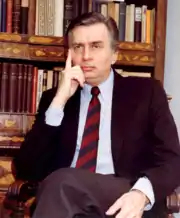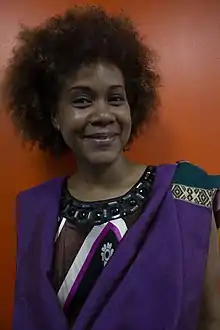ELTE Faculty of Humanities
The Faculty of Humanities is the oldest faculty of Eötvös Loránd University and is located on the institution's Trefort Garden campus in Józsefváros, Budapest, Hungary.[1] It was founded by the Cardinal Archbishop of Esztergom Prince Primate of Hungary, Péter Pázmány, in 1635.
ELTE Bölcsészettudományi Kar | |
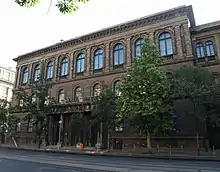 The main building of the Faculty of Humanities. | |
| Established | 1635 |
|---|---|
| Dean | Dávid Bartus |
Academic staff | 589 |
| Students | 6960 |
| Address | 4 Múzeum körút , , 1088 , |
| Campus | Urban |
Sporting affiliations | Budapesti EAC |
| Website | btk.elte.hu |
History
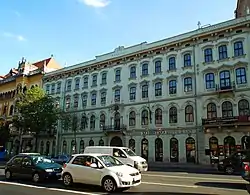
The Faculty of Humanities of the Eötvös Loránd University was founded by Péter Pázmány, Archbishop of Esztergom, on May 12, 1635. The university was operated by the Society of Jesus and it consisted of two faculties: The Faculty of Humanities and the Faculty of Theology.
Initially, there was only a three-year teaching program and students could obtain three academic titles: Bachelor's degree, Master's degree, and Doctor of Philosophy. In 1770, the Faculty of Humanities adopted the reforms introduced at the University of Vienna. The university then became state-owned and a dean and a director of the Faculty were appointed to monitor its functioning. In 1777, the Faculty of Humanities was moved to Buda, the western part of today's Budapest, along with the faculty of Theology and the Faculty of Law. However, the faculties were moved back seven years later. The late 18th century also saw changes in the university. The changes closely followed the pattern employed at the University of Vienna. However, the language of teaching remained Latin until 1844. The Hungarian Revolution of 1848 also affected the university, since a university reform program, designed by József Eötvös in 1850, restructured the educational system. Included in those changes: the two-year introductory course was abandoned and was replaced with a four-year program. In addition, the Faculty of Humanities became equal to other faculties of the university.
Not many students attended in the 1850s. However, an increase of students could be seen in the late 18th century.
In 1983, the Faculty of Teacher Training was established which meant the faculty of Humanities did not train primary and secondary school teachers. However, in 2003 the Faculty of Teacher Training was terminated and the Faculty of Humanities started training teachers again along with the Faculty of Natural Sciences.
The early 2000s saw major changes in the system of the Faculty of Humanities after new faculties were created. First, the Faculty of Primary and Pre-school Education was established in 2000. Second, the Faculty of Psychology and Education and the Faculty of Sociology were created in 2003.[2]
In 2005, Tibor Frank, professor at the School of English & American Studies, was interviewed by BBC on the 1956 Hungarian Revolution.[3]
In 2016, the findings of the Faculty's researchers on the Viking culture were featured in The Times.[4]
In 2018, Viktor Orbán's chief of staff announced that government would no longer finance any university programmes on gender studies.[5]
In 2018, many institutes of the Faculty expressed their solidarity with the George Soros-founded Central European University.[6]
On August 12, 2019, the Faculty's former student and professor, Agnes Heller, died.[7]
On September 5, 2022, the Dean of the Faculty announced that the autumn break would be postponed to December and the exams would be held online due to the energy crisis caused by the Russo-Ukrainian war.[8]
Institutes
The Faculty of Humanities consists of 16 institutes:[9]
| Institute of Ancient and Classical Studies[10] | Institute of Archaeological Sciences[11] |
| Institute of Arts Communication and Music[12] | Institute of Art History[13] |
| Institute of East Asian Studies[14] | Institute of Ethnography and Folklore[15] |
| Institute of Germanic Studies[16] | Institute of Hungarian Linguistics and Finno-Ugric Studies[17] |
| Institute of Hungarian Literature and Cultural Studies[18] | Institute of Historical Studies[19] |
| Institute of Language Mediation[20] | Institute of Library and Information Science[21] |
| Institute of Oriental Studies[22] | Institute of Philosophy[23] |
| Institute of Romance Studies[24] | Institute of Slavonic and Baltic Philology[25] |
| Institute for The Theory of Art and Media Studies[26] | School of English and American Studies[27] |
Organisation
The current leadership consists of 1 dean and 4 vice-deans.[28]
Faculty leadership
| Title | Name |
|---|---|
| Dean | Dávid Bartus[29] |
| Sub-dean | Ildikó Horn Krisztina Horváth Judit Bóna Ildikó Horváth |
Former Deans
- 1900–01: Frigyes Medveczky
- 1902–03: Imre Payer
- 1908–09: Oszkár Asbóth
- 1917–18: Ignác Goldziher
- 1925–26: Arthur Yolland
- 1927–28: Lajos Méhelÿ
- 1928–29: Antal Hekler
- 1932–33: Gyula Németh
- 1933–34: Gyula Kornis
- 1934–35: Zoltán Gombocz
- 1934–35: Gyula Németh
- 1944–47: István Hajnal
- 1956–57: István Kniezsa
- 1969–75: György Székely
- 2000–01: Sándor Fodor
Honorary doctors
The following people were awarded with Honorary title by the Faculty of Humanities.[30]
- 2020–21:
 Marie-Vic Ozouf-Marignier, az École des Hautes Études en Sciences Sociales (EHESS) professzora
Marie-Vic Ozouf-Marignier, az École des Hautes Études en Sciences Sociales (EHESS) professzora - 2019–20:
 Claus von Carnap-Bornheimet, a Christian-Albrechts-Universität professzora
Claus von Carnap-Bornheimet, a Christian-Albrechts-Universität professzora - 2017–18:
 Waldemar Zacharasiewicz, professor of University of Vienna
Waldemar Zacharasiewicz, professor of University of Vienna - 2016–17:
 Miklós Szabó, professor emeritus
Miklós Szabó, professor emeritus - 2016–17:
 Xu Lin, director of Language Education Council in China
Xu Lin, director of Language Education Council in China - 2015–16:
 Janusz K. Kozlowski, archeologist (professor emeritus)
Janusz K. Kozlowski, archeologist (professor emeritus) - 2014–15:
 Mario Vargas Llosa, Nobel prize winner writer
Mario Vargas Llosa, Nobel prize winner writer - 2013–14:
 Robert John Weston Evans, professor of Oxford University
Robert John Weston Evans, professor of Oxford University - 2012–13:
 Dominique Combe, professor of École normale supérieure
Dominique Combe, professor of École normale supérieure - 2012–13:
 Harriet Zuckerman, professor of Columbia University
Harriet Zuckerman, professor of Columbia University - 2012–13:
 Reinhard Olt, correspondent of Frankfurter Allgemeine Zeitung in Budapest
Reinhard Olt, correspondent of Frankfurter Allgemeine Zeitung in Budapest - 2011–12:
 Hans Ulrich Gumbrecht, professor of Stanford University
Hans Ulrich Gumbrecht, professor of Stanford University - 2010–11:
 Jacques Roubaud, contemporary French poet, mathematician, member of Oulipo
Jacques Roubaud, contemporary French poet, mathematician, member of Oulipo - 2010–11:
 Ferenc Pölöskei, professor at Eötvös Loránd Tudományegyetem
Ferenc Pölöskei, professor at Eötvös Loránd Tudományegyetem - 2009–10:
 José Saramago, Nobel Prize-winning writer†
José Saramago, Nobel Prize-winning writer† - 2008–09:
 Zsigmond Ritoók, professor emeritus
Zsigmond Ritoók, professor emeritus
Research
Currently, there are twenty-four research centres at the department level, institution level, and faculty level.[31]
In 1998, Zoltán Dörnyei and Kata Csizér's article was published by Language Teaching Research. In their study on Language Learning motivation, they compiled a set of strategies to facilitate language teachers how to motivate learners.[32]
On April 18, 2010, Eötvös Loránd University was officially granted the status of research university. The Faculty of Humanities along with the Faculty of Science and the Faculty of Law is the faculty that deals with scientific research activities. The Faculty of Humanities has always viewed scientific research and the education of future generations as highly important. Eötvös Loránd University was awarded the Social Renewal Operational Programme's research university bid called by the Hungarian National Development Agency (TÁMOP-4.2.1/B-09/1/KMR). The aim of the project was to improve the quality of higher education and foster university research. The project was implemented between June 1, 2010, and May 31, 2012, with a 3 billion forint grant from the government and the European Union.
On August 16, 2010, Dan Payne, from BBC, interviewed Károly Szerencsés from the Institute of History on the legacy of János Kádár.[33] The title of the article was "Hungary divided over Janos Kadar and his legacy".
Notable researchers
Notable alumni
- Géza Alföldy, historian
- József Antall, Prime Minister of Hungary, 1990–1993
- Wilhelm Bacher, Jewish Hungarian scholar, rabbi, Orientalist, and linguist
- Erzsébet Bajári, entomologist, wasp researcher
- Zsófia Bán, writer
- György Bence, philosopher
- Therese Benedek, Hungarian-American psychoanalyst
- Nóra Berend, historian
- András Bereznay, historian
- Jakob Bleyer, literary scholar
- Koloman Brenner, politician
- György Csepeli, psychologist
- Kata Csizér, applied linguist
- Mózes Csoma, koreanist
- Sándor Csoóri, writer
- Zoltán Dörnyei, applied linguist
- Ahn Eak-tai, Korean classical composer
- Péter Esterházy, novelist
- Kinga Fabó, poet, essayist, and linguist
- Endre Fülei-Szántó, linguist
- Alabert Fogarasi, philosopher
- Tibor Frank, historian
- László Garai, scholar of psychology
- Ágnes Gergely, writer
- Ferenc Glatz, historian (1964)
- István Hahn, historian
- Imre Hamar, sinologist
- Béla Hamvas, poet
- Pál Schiller Harkai, philosopher and psychologist
- Ágnes Heller, philosopher
- István Hiller, politician
- Rózsa Hoffmann, politician
- Zsuzsanna Jakab, director of the World Health Organization's Regional Office for Europe
- László Kákosy, egyptologist
- András Kenessei, art historian, writer and journalist
- Karl Kerényi, scholar in classical philology, co-founder of modern studies in Greek mythology
- György Konrád, novelist
- Judit Kormos, applied linguist
- Gyula Kornis, philosopher
- László Krasznahorkai, writer
- Viktor Kubiszyn, writer
- Endre Kukorelly, writer
- György Lukács, philosopher
- Tibor Lutter, literary scholar
- Bálint Magyar, politician
- Károly Marót, historian
- Péter Medgyes, linguist
- László Mérő, research psychologist and popular science author
- István Mészáros, philosopher
- Teodor Murăşanu, Romanian writer and teacher
- Ádám Nádasdy, linguist and poet
- Gábor Nógrádi, poet
- Raphael Patai, Hungarian-Jewish ethnographer, historian, Orientalist and anthropologist
- Ákos Pauler, philosopher
- Arthur J. Patterson, literary scholar
- Ágoston Pável, Hungarian Slovene writer, poet, ethnologist, linguist and historian
- Csaba Pléh, psychologist
- Karl Polanyi, philosopher and historian
- László Rudas, philosopher
- Mária Schmidt, historian
- Tamás Soproni, politician
- József Szájer, MEP (Fidesz)
- Miklós Szenczi, literary scholar
- Viktor Szigetvári, politician
- Ágnes Szokolszky, psychologist
- Stephen Ullmann, linguist of Romance languages, scholar of semantics
- Maria Sarungi Tsehai, activist
- István Stumpf, politician
- Gábor Vona, politician
- Moritz Wahrmann, politician
- Sándor Wekerle, three-time prime minister of the Kingdom of Hungary
- István Winkler, psychologist
- Arthur B. Yolland, literary scholar
Library
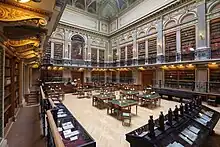
The Faculty has one main library, located in Trefort Garden,[34] and 13 libraries at institutional levels. The Institute of Romance Studies has libraries at the departmental level.
- School of English and American Studies Library
- Institute of Philosophy Library
- Institute of Germanic Studies Library
- Institute of Library and Information Science Library
- Institute of Hungarian Literature and Cultural Studies Toldy Ferenc Library
- Institute of Hungarian Linguistics and Finno-Ugric Studies Library
- Institute of Art History Library
- Institute of Ethnography and Folklore Library
- Institute of Ancient and Classical Studies Harmatta János Library
- Institute of Archaeological Sciences Library
- Institute of Slavonic and Baltic Philology Library
- Institute of East Asian Studies Library
- Institute of Historical Studies Szekfű Gyula Library
The library of Medieval Studies of the Central European University was located in the building of ELTE's Faculty of Humanities.[35]
Gallery
 Bird view
Bird view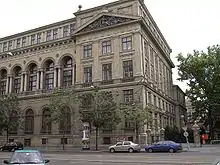 Main building
Main building
References
- "Eötvös Loránd University – Faculty of Humanities". elte.hu. April 10, 2022. Retrieved April 10, 2022.
- Borsodi, Csaba; Tüskés, Anna (2010). Az Eötvös Loránd Tudományegyetem Bölcsészettudományi Karának Története Képekben 1635–2010 (in Hungarian). Budapest: Eötvös Loránd Tudományegyetem. ISBN 978-963-284-169-4.
- "Hungary's 1956 brain drain". October 23, 2006. Retrieved July 4, 2022.
- Moody, Oliver. "Vikings took a crystal clear route across the Atlantic". The Times. ISSN 0140-0460. Retrieved July 4, 2022.
- "Combative premier Orban sends a chill through Hungarian culture". Financial Times. September 22, 2018. Retrieved July 17, 2022.
- Berlin, Oliver Moody. "Orban's Hungary drives out university founded by George Soros". The Times. ISSN 0140-0460. Retrieved July 4, 2022.
- "Agnes Heller obituary". The Times. ISSN 0140-0460. Retrieved July 4, 2022.
- "Elmarad az őszi szünet az egész ELTE-n a rezsiárak emelkedése miatt". telex (in Hungarian). September 6, 2022. Retrieved September 7, 2022.
- "Institutes of the Faculty of Humanities – ELTE". elte.hu. April 10, 2022. Retrieved April 10, 2022.
- "Institute of Ancient and Classical Studies | ELTE Faculty of Humanity". www.btk.elte.hu/en (in Hungarian). Retrieved July 30, 2022.
- "Institute of Archaeological Sciences | ELTE Faculty of Humanity". www.btk.elte.hu/en (in Hungarian). Retrieved July 30, 2022.
- "Institute of Arts Communication and Music | ELTE Faculty of Humanity". www.btk.elte.hu/en (in Hungarian). Retrieved July 30, 2022.
- "Institute of Art History | ELTE Faculty of Humanity". www.btk.elte.hu/en (in Hungarian). Retrieved July 30, 2022.
- "Institute of East Asian Studies | ELTE Faculty of Humanity". www.btk.elte.hu/en (in Hungarian). Retrieved July 30, 2022.
- "Institute of Ethnography and Folklore | ELTE Faculty of Humanity". www.btk.elte.hu/en (in Hungarian). Retrieved July 30, 2022.
- "Institute of Germanic Studies | ELTE Faculty of Humanity". www.btk.elte.hu/en (in Hungarian). Retrieved July 30, 2022.
- "Institute of Hungarian Linguistics and Finno-Ugric Studies | ELTE Faculty of Humanity". www.btk.elte.hu/en (in Hungarian). Retrieved July 30, 2022.
- "Institute of Hungarian Literature and Cultural Studies | ELTE Faculty of Humanity". www.btk.elte.hu/en (in Hungarian). Retrieved July 30, 2022.
- "Institute of Historical Studies | ELTE Faculty of Humanity". www.btk.elte.hu/en (in Hungarian). Retrieved July 30, 2022.
- "Institute of Language Mediation | ELTE Faculty of Humanity". www.btk.elte.hu/en (in Hungarian). Retrieved July 30, 2022.
- "Institute of Library and Information Science | ELTE Faculty of Humanity". www.btk.elte.hu/en (in Hungarian). Retrieved July 30, 2022.
- "Institute of Oriental Studies | ELTE Faculty of Humanity". www.btk.elte.hu/en (in Hungarian). Retrieved July 30, 2022.
- "Institute of Philosophy | ELTE Faculty of Humanity". www.btk.elte.hu/en (in Hungarian). Retrieved July 30, 2022.
- "Institute of Romance Studies | ELTE Faculty of Humanity". www.btk.elte.hu/en (in Hungarian). Retrieved July 30, 2022.
- "Institute of Slavonic and Baltic Philology | ELTE Faculty of Humanity". www.btk.elte.hu/en (in Hungarian). Retrieved July 30, 2022.
- "Institute for The Theory of Art and Media Studies | ELTE Faculty of Humanity". www.btk.elte.hu/en (in Hungarian). Retrieved July 30, 2022.
- "School of English and American Studies | ELTE Faculty of Humanity". www.btk.elte.hu/en (in Hungarian). Retrieved July 30, 2022.
- "Organisation of the Faculty of Humanities – ELTE". elte.hu. April 10, 2022. Retrieved April 10, 2022.
- "2021. Február 1-Töl Bartus Dávid A Bölcsészettudományi Kar Új Dékánja". btk.elte.hu. February 1, 2021. Retrieved April 14, 2022.
- "A Kar díszdoktorai". www.btk.elte.hu (in Hungarian). Retrieved December 7, 2022.
- "Research Centres at the Faculty of Humanities". elte.hu. April 10, 2022. Retrieved April 10, 2022.
- Dörnyei, Zoltán; Csizér, Kata (1998). "Ten commandments for motivating language learners: results of an empirical study". Language Teaching Research. 2 (3): 203–229. doi:10.1177/136216889800200303. ISSN 1362-1688. S2CID 9835663.
- "Hungary divided over Janos Kadar and his legacy". BBC News. August 16, 2010. Retrieved July 16, 2022.
- "KÖZPONTI KÖNYVTÁR". konyvtar.btk.elte.hu (in Hungarian). Retrieved August 30, 2022.
- "ELTE's leadership supports CEU". elte.hu. April 3, 2017. Retrieved April 15, 2022.
